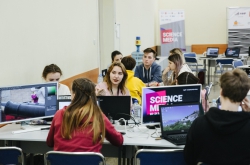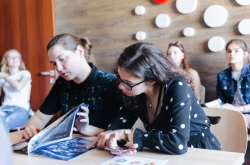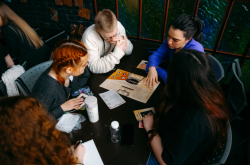Creating media from scratch and developing it to a level that exceeds mediocre student initiatives is no simple task, especially if most of your staff members are not professional journalists or even journalism students. They don't get paid, but they still have almost as much work as acting journalists. Enthusiasts face many challenges: funding, lack of space, equipment, skills. Sometimes even deciding on the goals and formats is a problem: everyone understands that student media are aimed at students, but what exactly do they have to offer? Winners of ScienceMedia-2017 shared about why media centers have become an essential part of the educational process and how one creates engaging content.
Aleksander Shidlovskiy, Belarus State Pedagogical University
 Alexander Shidlovskiy.
Alexander Shidlovskiy.
Winner in the "Best Media Coverage of the Forum in Social Networks"
This is the year I'm graduating, and I will soon become a teacher - I want to teach children arts. As for our student television, I work with video, and I do not plan on quitting this hobby which has already become my passion. During my second year at the university, we had this admission: they needed script writers, operators and editors for the student TV. I decided to give it a try. We shot the first run, and were accepted - this is how our BSPU Student Television came to be. We did it for ourselves, we liked it, we really enjoyed the process. While working on student media, you meet interesting people, learn new things and, what I think is most important, get invaluable experience. I believe that media centers are the best format for bringing information to students, for stimulating them, and video is the communication channel that is best. If done justice, it will definitely be successful. Now, we shoot videos for the whole university, promos for different event, competitions and such. Our goals are simple: we are to bring all kinds of information to the students, ones that will stimulate them to do something, fire them up, make them interested in some event or contest and entertain them. As for problems our editorial has to deal with, that is support from the university. We use our own equipment, which naturally won’t last forever. Also, we have trouble with getting some place where we could shoot different fun parts for the students. We have lots of ideas. Now we are trying to solve this issue by negotiating with the university's administration. As for the challenge any media faces - audience gain - we solve it by combining high quality content, a subtle approach, proper editing and, naturally, good PR-management.
Ekaterina Lebedinskaya, Saratov State University
Winner in the "Interview - Print Media" category
I got involved with SGUshenka to learn what working as a journalist feels like: getting everything done on time, never panicking, participating in contests with high competition. It turned out that winning really inspires you, and communicating with lots of people, learning the inner workings of media and dealing with criticism and your first mistakes is an unforgettable experience. Yet, I understand that in real editorials everything is a lot more strict, and every mistake has serious consequences. As trivial as it may sound, experience is what's important to me: in our editorial, everyone supports each other, and the editors are our true tutors and know when to criticize and when to praise us. Another reason for working like this is building your portfolio. And, naturally, being published in student media gives one an opportunity to participate in different forums and contests, compete, and get feedback from renowned journalists and experts. Thanks to SGUshenka, I got to see St. Petersburg for the first time, and participate in such a great and informative forum.
A university's life is full of interesting events, many of the students are noteworthy people about whom one can and should write. At the forum, I presented an interview with a foreign student from Nigeria who shared about his experience of immersing into a new unfamiliar culture. The "Saratov University" newspaper mostly covers official events, and that is what makes our SGUshenka so good: it's livelier, it tells of things the students find interesting - hobbies, people, journeys, events. This is not just some projection of the university's life, but interesting and diverse materials, something entertaining that can be of interest to many different people. Even people who don't have anything to do with our university often read SGUshenka and take copies home.

We distribute the magazine throughout the university, throughout all the faculties, so we have a large audience. Be the reader a philologist or a physicist, he will still find something for himself, as we write about science, arts, people and just different things anyone finds interesting. Our goal is to promote the magazine, get more visibility in the media. It was really great to learn that some of the forum's participants know of SGUshenka and like it.
We've been around for five years already, last October we had a big birthday. I believe that the greatest problem we face is topics, as we've written about many things during the past five years, and have to look for new ideas. To gain more audience, we try new approaches: use new formats, monitor SGUshenka's activity in social networks, create our unique style and do prize giveaways with our partners.
Igor Chermashentsev, National Research University of Electronic Technology
 Igor Chermashentsev, MIET-TV
Igor Chermashentsev, MIET-TV
Winner in the "Innovzglyad" (Innovative vision -- Ed.) special category
My specialization does not have much to do with Humanities, yet, I somehow got into the journalism field - even though we don't even have any programs related to journalism at our university. It all started when I was a first year and participated in the casting for MIET-TV, not really hoping to pass. Yet, I did, and since then I've been reading news for MIET-TV and our channel on YouTube. Now I'm one of our team's old-timers. At some point, I understood that I don't really like my field of study - I believe many can relate to that, and decided to focus on journalism. In 2016, I completed a journalism program from our INversia newspaper. Towards its end, each team had to present its project. Mine was the Lemniskata magazine which was on combining the incompatible, that is, science and art. I am really proud of it, especially its layout. After completing the program, I started working for the INversion newspaper and quickly became a proofreader. For this contest, I presented an article from Lemniskata and a piece from our TV channel. After the winners were announced, I was surprised to learn that it was the article that passed, as even I wasn't sure whether it was a proper article or just a project. It was flattering that it was me who got the Innovzglyad award, while some of my more experienced colleagues left the contest empty-handed. Our Editorial was really happy for me. As for me, developing student media is not just getting great experience in rhetoric skills and publications writing, but also some personal PR-campaign, an opportunity to come out. Though I may be a bit old as a student, I still hope to get into the newspaper's regular staff and earn at least some money. As for media centers, I believe that in the world where there is so much information that your five senses and word of mouth is no longer enough, media is especially important. For young people, whose pace of life is really swift, the problem of the information's quality is really pressing. It is really easy to miss something out and fall behind those who know a bit more. This is why media centers are so important. They also act as mediators between administration and students, which makes the educational process more democratic.
My own editorial consists of only five people including myself, so staff is an issue. Also, we don't have an office, funding, and our audience is quite limited. All of these problems have to do with our magazine being only a project a while ago, it has yet to get the traits of a full-fledged title. Yet, we plan on looking for more personnel, negotiating with administration and even trying to raise money by crowdfunding.
Maria Lukinenko, Samara State University
 Maria Lukinenko, Polet (Flight -- Ed.) newspaper of Samara State University
Maria Lukinenko, Polet (Flight -- Ed.) newspaper of Samara State University
Polet newspaper
Winner in the "News Item - Electronic Edition" category
I like working for a newspaper, as it lets you to stay on top of things, get new knowledge and share it with others. Media centers in universities are essential for providing communication between students and staff. Thanks to them, we know when some event will be, which clubs we can join, where contests and competitions will take place, as well as get information about science, art and new inventions. For example, our newspaper is aimed at a wide audience - students and staff of Samara State University, scientists and even those who've been to our university just once. Our main goal is to form a common informational space and record our university's life. Surely, we face problems from time to time, but we always find ways to solve them. For instance, to develop the media environment at our university, we launched a journalism school and gave students an opportunity to create their own editorials based on faculties. We solved the problem with illustrations by opening Photography clubs. Another issue we have to deal with is that we don't have any on-site briefings, we do everything virtually. Yet, thanks to our chief editor, Elena Pamursina, everything stays under control. It was she who fostered our interest in journalism. She is a great person and a real professional, a leader who defines the team's success.





